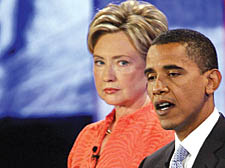|
|
 |
| |

Hillary Clinton and Barack Obama |
Manufacturing our consent is a business concern too far
The manipulation of an American presidential debate is a clear-cut example of the media dumbing-down, says Victoria Brittain
TWO weeks ago Democratic contenders for the US presidency held a debate in Las Vegas hosted by NBC. The agreed speakers were Obama, Clinton, Edwards, and the Ohio Congressman Dennis Kucinich.
But just two days before the event, NBC announced that the criteria had changed, and Kucinich was no longer qualified. He went to court and a Nevada judge ordered NBC to include him.
In his lawsuit, Kucinich argued that NBC – owned by General Electric (GE) – illegally shut him out of the debate because of his views.
The lawsuit charged, “a blatant violation of the media’s obligation to operate in the public interest… NBC revised its criteria to specifically exclude the diverse and anti-war voice of Kucinich and his grass-roots supporters”.
NBC appealed, and an hour before the broadcast, the Nevada Supreme Court sided with NBC and the congressman was silenced.
This is a story for our times for two reasons.
The first and obvious one is how it illustrates the naked use of big business’ power to make media work for its interests.
GE’s commercial interests do not allow NBC journalists to work freely. We don’t often get an example that so clearly shows the media world we are living in. We’ve come to take it for granted.
As Kucinich put it, “It goes right to the question of democratic governance, whether a broadcast network can choose who the candidates will be based on their narrow concerns – GE, NBC and Raytheon, another one of GE’s property, have all contributed substantially to Democratic candidates who were in the debate. And, with GE being involved with Raytheon, another defence contractor, they have an interest in war continuing. So NBC ends up being their propaganda arm to be able to advance their economic interests.”
You can see why NBC’s bosses would go to the Supreme Court to keep him off the show, which was going to be seen by millions of Americans, and it is hardly a surprise that yesterday he pulled out of the race for financial reasons.
The second bit of the story is what is new.
The Congressman wasn’t silenced after all. The incomparable Amy Goodman’s Democracy Now! television and radio show put the congressman on air, and played excerpts from the three-person debate, letting him reply as though he’d been in the studio when it was going on. In 90-second chunks he transformed the debate from what he called “a bunch of nuancing”.
Kucinich would like oversight on hedge funds (which are supporting all the other candidates, he pointed out); he wants US troops out of Iraq in three months; he wants to get rid of “the crooked contractors and mercenaries” there; he wants Iraq’s $30 billion oil wealth to belong to the Iraqis; he wants reparations to the Iraqis from the US for destroying their country; at home he wants a real debate on renewable energy instead of nuclear (in which GE is a big player).
Thanks to the internet and to a tiny under-funded independent journalistic operation, anyone can now hear and see Kucinich.
Journalists at NBC who’ve listened to the Democracy Now! version must have regretted how dull their programme was in comparison. Big business-run political coverage equals play safe, be dull.
This is just one aspect of the great media dumbing down, which no one any longer contests is happening.
TV is full of games shows, chefs, gardeners, football and house buying. Much of it is now on the level of the tabloid press – our society’s daily poison for the mind.
Even the serious papers assiduously cover celebrities’ lives at inordinate, mind-numbing length, as for instance in the ludicrous, tasteless so-called inquest into the death of Diana, Princess of Wales.
Give me the internet and Amy Goodman, Counter Punch, Truth Out from the US, and Europe’s terrific Courrier International, which brings you articles from papers based from Peru to Thailand, and Japan to Botswana.
In many mainstream media organisations, management’s panicked response to the net has been to go for more and more quantity, and 24 hour a day news – their journalists must write their stories for the web site, for the paper, and create pod casts and videos.
This is an attack on quality, which cannot survive without the time for research and reflection. In the new dumbed-down commercial media world it seems this obvious point is ignored.
To return to Amy Goodman, and who chooses to watch or listen to her show, I suspect – and of course I hope – it’s a young audience, just as Obama or Kucinich attracts a young following.
That is the age group which idealistically believes in change, and knows how the mainstream media mostly fails to reflect their concerns or give them keys to the wider world – because it is not in the interest of their owners.
I want to end by reminding you of the seminal work on media and its commercial ownership, and the corrosive effects of that ownership. Manufacturing Consent by Ed Harman and Noam Chomsky was published in 1988 – it’s a wake-up call to complacency about our industry’s role in society, the title says it all.
|
 |
|
| |
|
 |
|